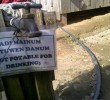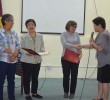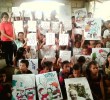From the ground: The story of Kababaihang Nagtataglay ng Bihirang Lakas (KNBL or Federation of Women Farmers in Davao) KNBL is a federation of thirteen women peasant organizations (POs) from the 3rd district of Davao City (Talomo and Calinan). Majority of its members are from indigenous people’s groups.
KNBL members are encouraged to shift to organic agriculture by hands-on training, which includes trainings on food sovereignty, sufficient food supply (for the household), and health — especially the realization of the ill effects of inorganic farming on the producers themselves. They are taught with production of own inputs like fertilizer. Each member is encouraged to have a “faith garden” or vegetable garden to see and believe the benefits of organic farming practice.
MASIPAG oriented KNBL organizations on sustainable agriculture in 2002-2004. The federation was formally organized in 2004 through an assembly and was registered with the Securities and Exchange Commission in the same year.
KNBL members derive their income mainly from corn and rootscrops such as cassava, karlang, and sweet potato. They also engage in fruits production with minimal sales, since most of their produce is still intended for family consumption. They raise native chicken, ducks, and hogs.
Majority of KNBL’s members are already full organic practitioners, planting vegetables and fruit trees. Some of the members are tenants. While KNBL is a women’s organization, METSA Foundation, the non-government organization (NGO) assisting KNBL, has started to train the members’ husbands in cultivating organic rice.
Coordinating with local government
KNBL has a place at the Calinan public market, which it rents for Php5 every Sunday. It also has a place in downtown Davao in Rizal Park, where members sell their fresh organic products as well as processed organic goods every Friday. The market is participated in by other NGOs and POs that are also organic farming advocates; the initiative is through the City Agriculture Office.
The Davao City ordinance on organic agriculture was ahead of the national OAA legislation. NGOs and POs lobbied at the Davao City Hall to go organic, and the LGU responded positively. The local government unit (LGU) support actually started with the campaign on anti-aerial spraying on banana plantations within populated areas in Davao City and the whole of Davao province. The campaign led to Mayor Rodrigo Duterte’s banning of aerial spraying in all banana plantations in the city.
The KNBL is a member of the Technical Committee on Organic Agriculture and it coordinates with the DA on the promotion of organic agriculture and trainings. KNBL’s advocacy is not only organic farming but also women empowerment, reproductive health, and environmental concerns including climate change.
Practicing DIFS
The KNBL POs practice diversified and integrated farming system or DIFS. They make their own biological insecticides from madre cacao, baho-baho na dahon, and chili. They grow pest attractants like cosmos. They use animal manure for fertilizers such as hog, goat and carabao manure.
They use whatever is available in their farms and gardens to save up on costs. They plant what they need for their inputs. They combine urine and water to flower plants and use cloth wet with urine to ward off pests from the vegetables. They hang these around their gardens.
KNBL has committees and holds meetings once a month where members share knowledge and farming experiences including new discoveries. They have committee on training and education for sustainable agriculture, including food processing, herbal processing for their own consumption and for selling to add to their income generation.
They practice bayanihan to cut on labor costs. They try to convince their husbands as well to practice organic farming and have so far succeeded in convincing two male partners to cultivate rice in a two-hectare farm. Members communally share their income from their livestock and poultry.
KNBL farms follow standards set by the MASIPAG Farmers Guarantee System (MFGS) in their organic farming. The key to long-term practice, according to them, is to make sustainable agriculture a lifestyle, a way of life.
The benefits of organic farming
Many of the KNBL members are tenants. The sharing is 70:30 in favor of the landowner for corn and coconut; for lanzones, the landowner gets Php1 per kilo or 1:4 per sack in favor of the tenant.
Spending less. Organic farming has helped the farmers in their daily expenses as they earn from selling organic vegetables at the Calinan public market (Php500 net) and in Davao City (Php300 net), making a weekly net income of Php900 to Php1,200.
Consumers buy organic vegetables first even if they are a little more expensive than inorganic vegetables (about Php10 per kilo).
Organic farmers spend less. It takes about four to five months before organic vegetables stop producing for harvest, much longer compared to the harvest of inorganic vegetables which lasts only for three months.
KNBL farmers sell plenty of bananas, taro (gabi), and other root crops.
They seldom borrow. Their practice of bayanihan equips them so as to no longer borrow from traders, for labor cost for instance.
Food security. Organic farmers produce vegetables and corn (their staple) for their consumption, and bananas, mung beans, peanuts and other surplus produce to sell.
They no longer have to buy these outside. They buy rice from BUSAFO because they do not produce rice yet.
Health. Organic farmers’ food is safe and sufficient for their nutritional needs, especially malunggay and camote tops as sources of iron and other vitamins and fruits for vitamin C.
Their children are not sickly because they get enough nutrition from vegetables. Their medicines are available from their gardens, for instance turmeric for fever and cough and camote tops for ulcer and blood diseases.
Environment. Farmers have cosmos and marigold to ward off insects from vegetables. The soil is healthy and fertile – it is dark and is fit to grow an abundant variety of plants.
There are local strawberries or sampinit, carabao grass, kabilao, and bagon or cover crop. In KNBL areas, there is a natural reservoir for the irrigation of organic farms. There are plenty of insects like grasshoppers or apan-apan, spiders, butterflies, and dragonflies. The air is fresh and clean.
Challenges. The biggest challenge in Davao is the existence of large banana and pineapple plantations that span indigenous people’s and organic farming areas.
These public land areas are leased to Ayala Highland and Sumifro. Conventional practice in these banana and pineapple plantations contaminates the organic farms.
Sumifro used to practice contract growing for Bt corn near the organic farms of indigenous folk in Marilog district, challenging organic farmers.
This was stopped after KNBL advocated against it.










